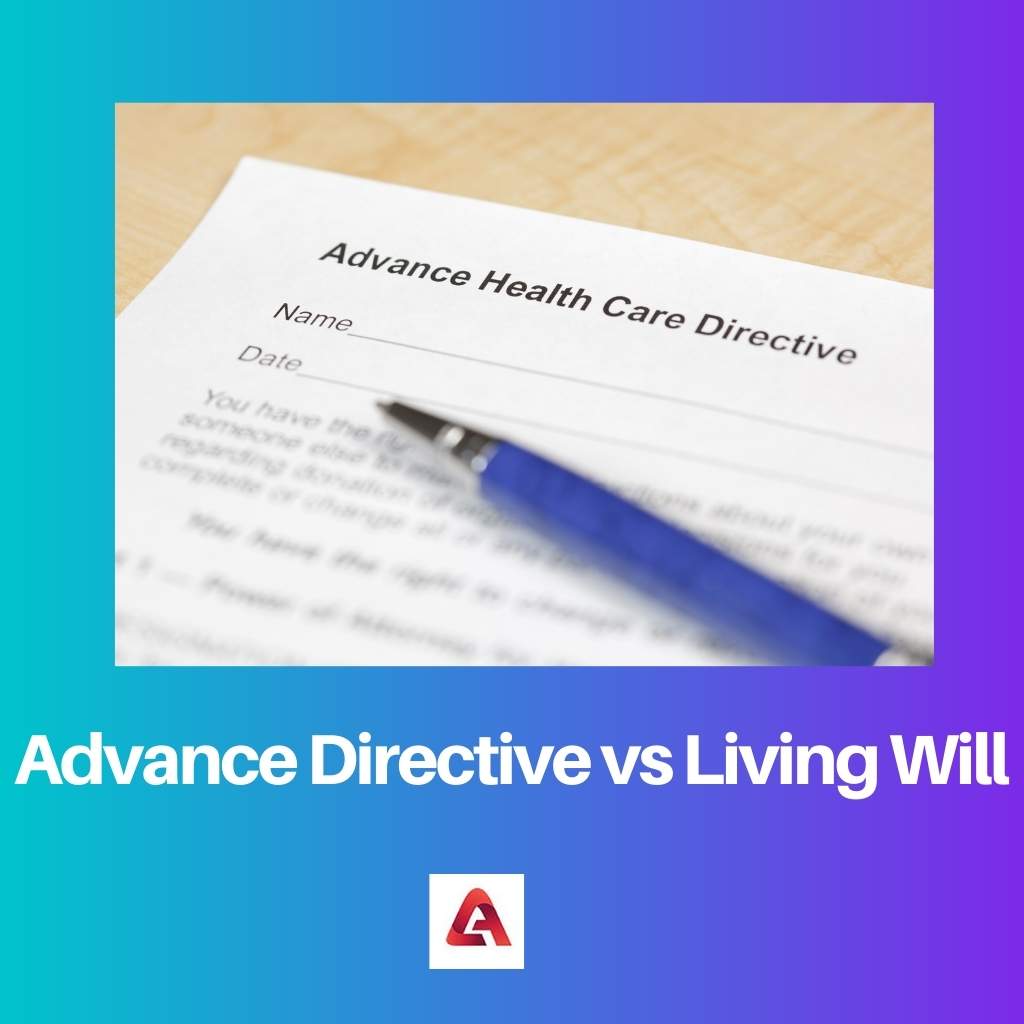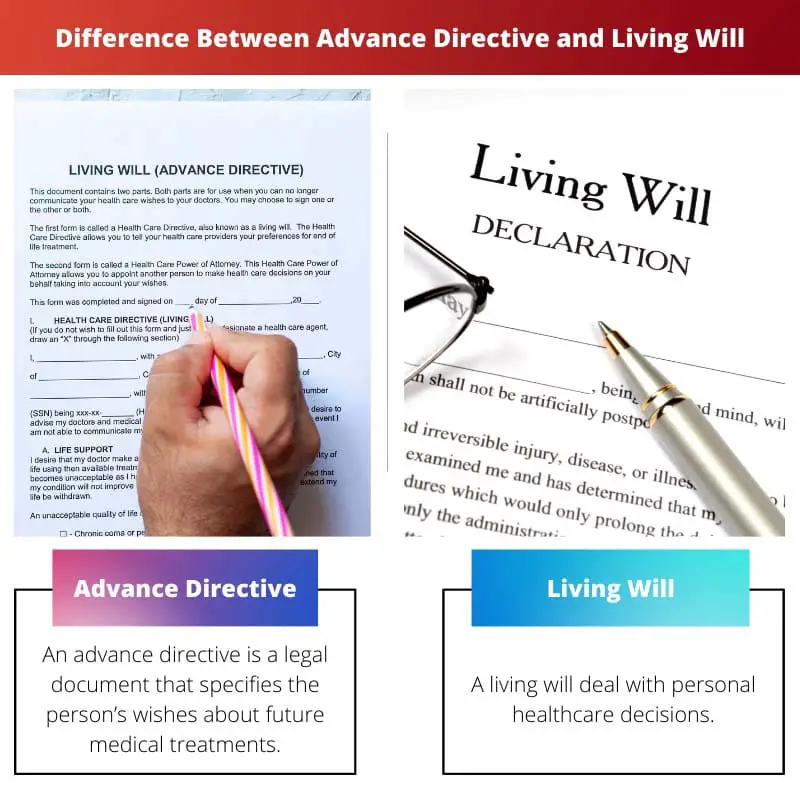An Advance Directive and a Living Will are two documents that may be used to express the final wishes of an individual when it comes to medical care. There are different types of living wills, but generally, they state whether or not someone wants life-sustaining treatment to be administered in certain situations.
An Advance Directive is more comprehensive and includes instructions about how people want their health information handled before death; this document also states who should make decisions for them if they become incapacitated or unable to speak for themselves.
Key Takeaways
- An advance directive is a legal document that outlines a person’s preferences for medical treatment. At the same time, a living will is a type of advance directive that specifies the type of medical treatment a person wants in case of a terminal illness or injury.
- An advance directive also includes a healthcare proxy or durable power of attorney, which allows a designated person to make healthcare decisions on behalf of the person in case they cannot do so. In contrast, a living will do not include this option.
- An advance directive is broader in scope and covers a wide range of medical decisions, while a living will is more specific to end-of-life care.
Advance Directive vs Living Will
An advance directive is a broad term that means any legal document that outlines an individual’s healthcare wishes. A living will is a specific type of advance directive that details an individual’s preferences for end-of-life care, such as life-sustaining treatments and pain management.

An Advance Directive is more comprehensive and includes instructions about how people want their health information handled before death; this document also states who should make decisions for them if they become incapacitated or unable to speak for themselves.
Advances directives have many advantages, including the fact that they can reduce family conflict when an individual becomes incapacitated. Living Will, on the other hand, deals with one’s wishes regarding life-sustaining treatment in the event that they are unable to communicate their health care decisions.
A living will is a legal document that states your wishes about end-of-life care, such as whether or not you want to be hooked up to life support if it looks like recovery may not occur.
Comparison Table
| Parameters of Comparison | Advance Directive | Living Will |
|---|---|---|
| Intended Audience | Intended to be used by all adults. | Intended to be created for a specific person. |
| Terms Used | An advance directive is a general term, | Whereas living will deal with specific instructions to patients and doctors. |
| Purpose | An advance directive is a legal document that specifies the person’s wishes about future medical treatments. | A living will deal with personal healthcare decisions. |
| Applicability | In most states, an adult can create either an advance directive or a living will for themselves to indicate their preferences regarding future treatment options. | However, living wills are more specific about consent for treatment decisions. |
| Legal Effectiveness | An advance directive is legally binding but a living will isn’t always enforced by courts or health care institutions. | However, a living will isn’t always effective to uphold this kind of treatment choice against the patient’s wishes. |
What is Advance Directive?
An Advance Directive is a legal document that specifies the type of medical care you want to receive and who should make healthcare decisions for you if your wishes are disregarded.
An advance directive is a document that outlines your health care preferences, including end-of-life decisions. This type of directive deals with a situation where everyone agrees to certain measures being taken in order to save your life, though you disagree because they go against what you believe in.
An advance directive, also called a “healthcare power of attorney,” authorizes another person to make decisions for you when you cannot. The document names the person who will be authorized to make these medical decisions and establishes what types of procedures can be used or refused (i.e., life-sustaining treatments, blood transfusions).
An advance directive gives someone else instructions about what should be done if you are unable to speak for yourself. The person who will carry out your wishes is called an agent or surrogate decision-maker.
With this document, you can appoint one person as your agent and decide in advance how much or how little authority you want to give that person. An advance directive is a legal document that allows someone to state his or her wishes about future medical care before being incapacitated by illness, injury, surgery, or age.
This kind of advance planning ensures the patient’s preferences will be respected even when he or she can’t speak for him/herself due to incapacity.

What is Living Will?
A living will, also known as an advance directive or “advance healthcare directive,” does not authorize anyone else to make decisions for you. Living wills are very specific and deal with the refusal of life-sustaining treatment, such as a feeding tube or respirator.
A living will is designed to protect your wishes when everyone else agrees that certain measures should be taken in order to save your life, but you disagree because they go against what you believe in (e.g., you’re a devout Jehovah’s Witness and do not accept blood transfusions).
A living will set out the kind of medical treatment you do or don’t want in the future if, for example, your doctor says there’s nothing more they can do and asks whether you want life support turned off.
It allows people to set out ahead of time their wishes for the future. That means they can specify whether or not they want to be resuscitated, what treatments they do and don’t consent to, who will make these decisions if necessary and where they would prefer to receive treatment.
A living will is combined with a durable power of attorney, while an advance directive spells out your choices in this area in more detail.

Main Differences Between Advance Directive and Living Will
- Advance Directive is the broad term for all written healthcare instructions, whereas Living Will is also known as an “advance medical directive” or a “healthcare proxy.”
- Advance Directive is a general term, whereas Living Will deals with specific instructions to patients and their doctors.
- Advance Directive is intended to be used by all adults, whereas Living Will should be created for a specific person.
- Advance Directive is designed to address medical treatments, whereas Living Will deals with personal healthcare decisions.
- Advance Directive is legally binding in some states, whereas Living Will may only be valid if the person becomes incapacitated.

- https://jamanetwork.com/journals/jama/article-abstract/192502
- https://onlinelibrary.wiley.com/doi/abs/10.2307/3527683

The comparison drawn between an Advance Directive and a Living Will in the article is highly informative. It serves as a comprehensive guide for anyone looking to understand the nuances of these legal documents.
Absolutely, the article covers all the essential aspects in a way that’s easy to comprehend.
I found the breakdown of the legal effectiveness of both documents to be particularly enlightening.
The article effectively outlines the purpose and applicability of an Advance Directive and a Living Will, providing valuable insights for those considering these legal documents for future healthcare planning.
The distinction between an Advance Directive and a Living Will, along with their intended audience and purpose, is clearly articulated in the article, making it a valuable resource for those wanting to make informed decisions about their healthcare preferences.
Completely agree. It’s crucial to have a solid understanding of these documents for future healthcare planning.
The article’s detailed explanations provide a comprehensive overview of these crucial legal documents.
The article not only explains the differences between an Advance Directive and a Living Will but also emphasizes their importance. It’s an excellent resource for anyone looking to make informed decisions about their future healthcare wishes.
Absolutely, the article goes into great detail about the significance of these legal documents.
I found the detailed explanations about each document to be very insightful and helpful.
The article offers a thorough explanation of what an Advance Directive entails, as well as its significance for an individual’s future medical care. It’s important information for anyone looking to engage in advance planning for healthcare decisions.
Absolutely, this article provides a comprehensive understanding of these critical legal documents.
This article effectively breaks down the intention and legal effectiveness of both an Advance Directive and a Living Will, thus providing a thorough understanding of these legal documents to benefit anyone planning for their future healthcare decisions.
Absolutely, the article is an excellent guide for individuals looking to understand the implications of these legal documents.
I found the comparison table particularly helpful in understanding the distinctions between an Advance Directive and a Living Will.
The distinction between an Advance Directive and a Living Will is vital to ensure that an individual’s healthcare preferences are respected. This article does an excellent job of explaining the differences and the legal effectiveness of both documents.
Absolutely, there’s a lot of valuable information here about how to approach future medical care and decision-making.
The comparison table provided in the article is very informative, and it helps to clearly distinguish between an Advance Directive and a Living Will. It’s essential for everyone to understand these differences.
Absolutely, the table really helps to highlight the key distinctions between the two legal documents.
I couldn’t agree more. The article does a great job of breaking down the information in a clear and understandable manner.
The article provides a clear and concise explanation of the difference between an Advance Directive and a Living Will, as well as the key takeaways. The comparison table is also very informative.
I agree. The article is very well-written and provides valuable information for anyone looking to understand these legal documents.
The article illustrates the crucial details of what an Advance Directive encompasses and how it differs from a Living Will. It is essential to have this knowledge when planning for healthcare decisions in the future.
Yes, having a clear understanding of these legal documents is crucial to ensuring one’s wishes are upheld in the event of incapacitation.